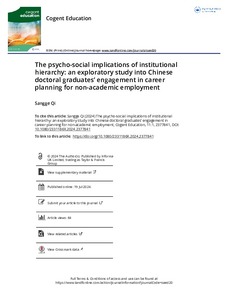The psycho-social implications of institutional hierarchy : an exploratory study into Chinese doctoral graduates' engagement in career planning for non-academic employment
Qi, Sangge
The psycho-social implications of institutional hierarchy : an exploratory study into Chinese doctoral graduates' engagement in career planning for non-academic employment
Qi, Sangge
Taylor & Francis
Julkaisun pysyvä osoite on:
https://urn.fi/URN:NBN:fi-fe2025082787551
https://urn.fi/URN:NBN:fi-fe2025082787551
Tiivistelmä
Within high-participation systems of higher education such as China, the value of degrees is divided between credentials offering relatively high positional value and those offering less value. With that, institutional hierarchy plays a significant role in shaping graduate employability. This paper illustrates the contrasting experiences of two Chinese female doctoral graduates from universities associated with distinct reputational statuses in planning and strategizing for post-graduation employment outside academia, with particular focus on the psycho-social implications of institutional hierarchy and its manifestation at an intimate level as emotionally-charged perceptions and practices. Drawing upon the extended conceptualization of habitus as the theoretical lens, the analysis illuminates that the internalized institutional hierarchy contains a set of emotional attachments aligned with the reputational statuses of graduates' own universities that are deposited in their habitus. Individual feeling, thinking and practices are thus connected, shaping graduates' perceptions of themselves as a graduate job seeker and their relative chances of success in the job competition, and the subsequent practices of planning and preparation for post-PhD careers.
Kokoelmat
- Rinnakkaistallenteet [29335]
